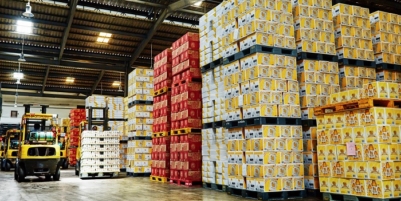-
BLACKOUT TECHNOLOGIES TARGETS TELEMATICS-INTEGRATED MOBILE DEVICE BLOCKING TO COMBAT SMARTPHONE DISTRACTION - April 1, 2025
-
OpenADR Alliance announces first OpenADR 3.0 certified products with EVoke Systems, E.ON Energy and Universal Devices - March 25, 2025
-
Growing fulfilment and contract packer appoints new Managing Director - March 25, 2025
-
When is it time to invest in a WMS? Understanding the key trigger points - March 25, 2025
-
eCapital helps Vantage Recruitment on its journey to financial success - March 24, 2025
-
Hugo Beck Celebrates 70 Years of Packaging Innovation with Open House Events - March 20, 2025
-
PROLOG FULFILMENT SUPPORTS LUNA DAILY’S COMMITMENT TO BETTER BODY CARE FOR ALL WOMEN - March 19, 2025
-
Motion Ventures launches largest-ever maritime tech fund at $100M to meet the industry’s new pace of adoption - March 18, 2025
-
ITD GLOBAL APPOINTS GROUP CHIEF REVENUE OFFICER - March 17, 2025
-
SURECAM TEAMS UP WITH ENTERPRISE FLEX-E-RENT FOR VEHICLE REPAIR & MAINTENANCE CONFERENCE - March 14, 2025
Logistics confidence falls to second lowest level on record, as operators take a ‘reality check’ – new study finds
- Confidence in the logistics sector falls to second lowest level on record – just above COVID-19 levels
- Three-quarters of operators feel business conditions are more difficult now than a year ago
- Levels of demand the number one concern for 71% of logistics businesses
- However, around four in 10 predict a rise in profits over the next 12 months.
Confidence in the logistics sector has fallen to its second lowest level on record, only slightly above that seen during the first COVID-19 lockdown in 2020, a new industry report has found.
According to the Barclays-BDO UK Logistics Confidence Index 2023, this year’s score is 47.3, down from 50.4 in 2022. In 2020, the confidence index stood at 47.1. Any index figure below 50 indicates overall pessimism in the logistics sector – a sector that is integral to the functioning of our society at many levels and regarded as a useful barometer of the state of the wider economy.
The latest figure is in contrast to the marked optimism seen in 2021, which produced an index reading of 62.5, as the sector bounced back from the effects of the pandemic – a time of increased levels of home delivery and higher rates for global logistics services.
The latest study from Barclays Corporate Banking and accountancy and business advisory firm, BDO LLP, found that three quarters of operators (75%) feel business conditions are more difficult now than a year ago, with levels of demand the number one concern for 71% of logistics businesses.
Interestingly, staff shortages and increased labour costs – a perennial problem for the sector – are becoming less of a concern for businesses. Less than half of logistics leaders see it as a major challenge in the next 12 months. Challenges in recruiting warehousing staff and LCV drivers have also eased as volumes fall.
Jason Whitworth, corporate finance partner at BDO LLP, commented: “Given the economic environment and market dynamics, it’s not surprising that the industry is cautious about the current trading environment, with real concern over volume of activity across certain sub-markets. As always, the logistics industry is feeling the effects of a tightening economic climate more than most, as inflation and interest rate rises continue to have an impact on consumer behaviour.
“Despite the lower overall confidence, there are still plenty of opportunities for operators, including greater collaboration with customers and other providers in the sector in areas such as shared-user warehousing, shared transport space, as well as electric vehicle charging or alternative fuel infrastructure.”
The report also showed that nearly nine in 10 respondents are investing in environmental, social and governance (ESG) projects. While the majority are driven by playing their part to combat climate change, there is clear acknowledgement of the growing commercial importance of being able to demonstrate ESG credentials in winning new business. There is a willingness to consider alternative fuel types, with electric solutions a top priority for investment, albeit jointly with diesel, suggesting the alternatives are not yet viable in many cases.
Whitworth added: “Investment in technology and ESG measures is a positive step to pursuing both cost savings and gaining competitive advantage. In addition, due to a need by many operators to boost volumes through new service offerings or breaking into new sectors, appetite for M&A activity remains strong.”
Looking at growth opportunities in the next 12 months, the most popular strategy is cost control and efficiency. According to the research, this is also one of the main drivers of investment in technology. More than half of businesses see this as an opportunity and, as in previous years, most will spend on upgrades to and replacement of existing technology. With the rise in cybercrime across all industries, cyber security is the second highest priority.
James Lean, Industry Director for Manufacturing, Transport & Logistics at Barclays Corporate Banking, said: “It is consistent with other global indexes to see the UK logistics sector feeling at a low level of confidence following the realigning of supply chain capacity. However, as our report shows, despite cooler demand from manufacturers and wholesalers, this resilient sector continues to look to the future, adapting their business models through digital strategies, investing in fixed assets and importantly their people.”

































